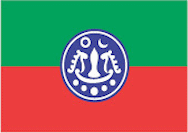Rohingya - 2012
 More than 100 people were killed in Rakhine in 2012 and 100,000 remain in camps following clashes between the Rohingya Muslim minority and the Buddhist majority. The Myanmar government and the country’s Buddhist majority call the Rohingya “Bengalis” because they consider them to be illegal immigrants from neighboring Bangladesh, and deny them basic rights, freedom of movement, and access to social services and education.
More than 100 people were killed in Rakhine in 2012 and 100,000 remain in camps following clashes between the Rohingya Muslim minority and the Buddhist majority. The Myanmar government and the country’s Buddhist majority call the Rohingya “Bengalis” because they consider them to be illegal immigrants from neighboring Bangladesh, and deny them basic rights, freedom of movement, and access to social services and education.
Though Rohingya had been victims of state-sponsored discrimination for decades, conditions started deteriorating in 2012 after the predominantly Buddhist country of 50 million began its bumpy transition from a half-century of dictatorship to democracy. Taking advantage of newfound freedoms of expression, radical monks started fanning deep-seated societal hatred for the religious minority. Hundreds were killed by machete-wielding mobs and a quarter million others now live under apartheid-like conditions in camps or have fled by boat -hundreds of dehydrated, hungry Rohingya washing onto Southeast Asian shores in recent weeks.
Months of ethnic and sectarian violence displaced tens of thousands until security forces moved in and imposed tight controls. Authorities want these people to first identify themselves as Bengalis before the government determines whether they can become citizens.
Since violence erupted in June 2012, the Burmese Government forced people into relief camps so that it could confiscate their land, homes, and property for redistribution to the Buddhist Rakhine. The investigative commission convened by President Thein Sein to look into the causes of the June 12th violence did little more than recommend further segregation of the Rohingya, deploying more security personnel into the Rakhine state, and instituting a family planning program to reduce the growth rate of the Muslim population. Further exacerbating the situation, most Burmans classify the Rohingya as ``Bengali Muslims'' and would prefer they return to Bangladesh. However, Bangladesh does not accept the Rohingya population as Bengali and refuses them citizenship rights as well.
Samantha Power, Special Assistant to the President, Senior Director for Multilateral Affairs and Human Rights, National Security Council, stated on November 15th 2012: "The peril faced by the stateless Rohingya population in Rakhine State is particularly urgent, and we have joined the international community in expressing deep concern about recent violence that has left hundreds dead, displaced over 110,000, and destroyed thousands of homes. There is much work to be done to foster peace and reconciliation in other ethnic conflicts, develop the justice sector, and cultivate the free press and robust civil society that are the checks and balances needed in any stable democracy. But we also see an historic opportunity both to help Burma lock in the progress that it has made so far — so that it becomes irreversible — and to meet the many challenges in front of it. "
The UN and US called for an investigation of the Rohingya Muslims that were being trafficked by Thai officials into human trafficking rings and held hostage in camps near the Malaysian border until relatives pay ransoms to release them. Some have been beaten, while others have been killed. Nonetheless, the Burmese Government was reportedly doing little, but rather supporting Burma's anti-Islam movement.
|
NEWSLETTER
|
| Join the GlobalSecurity.org mailing list |
|
|
|

